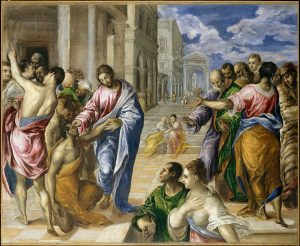What does it mean for someone to have a God? In Biblical terms, we have only to look to the heroes of the faith to understand that having a God means having a relationship with the Supreme Being that is characterized by belief, trust, service, obedience, and worship. To that end, many Christians would be surprised to learn that Jesus has a God. But such news has been hiding in plain sight. Twelve New Testament passages clearly attest to this fact.
The Apostle Paul
The apostle Paul explicitly wrote that Jesus has a God.
2 Corinthians 1:2-3 (NASB) Grace to you and peace from God our Father and the Lord Jesus Christ. 3 Blessed be the God and Father of our Lord Jesus Christ, the Father of mercies and God of all comfort (emphasis added)
2 Corinthians 11:30-31 (NASB) If I have to boast, I will boast of what pertains to my weakness. 31 The God and Father of the Lord Jesus, He who is blessed forever, knows that I am not lying. (emphasis added)
Ephesians 1:1-3 (NASB) Paul, an apostle of Christ Jesus by the will of God, to the saints who are at Ephesus and who are faithful in Christ Jesus: 2 Grace to you and peace from God our Father and the Lord Jesus Christ. 3 Blessed be the God and Father of our Lord Jesus Christ, who has blessed us with every spiritual blessing in the heavenly places in Christ, (emphasis added)
Ephesians 1:15-17 (NASB) For this reason I too, having heard of the faith in the Lord Jesus which exists among you and your love for all the saints, 16 do not cease giving thanks for you, while making mention of you in my prayers; 17 that the God of our Lord Jesus Christ, the Father of glory, may give to you a spirit of wisdom and of revelation in the knowledge of Him. (emphasis added)
Romans 15:5-6 (NASB) Now may the God who gives perseverance and encouragement grant you to be of the same mind with one another according to Christ Jesus, 6 so that with one accord you may with one voice glorify the God and Father of our Lord Jesus Christ. (emphasis added)
The Apostle Peter
Paul is not alone in his proclamation that God the Father is the God of Jesus. Peter also declares this truth:
1 Peter 1:3 (NASB) Blessed be the God and Father of our Lord Jesus Christ, who according to His great mercy has caused us to be born again to a living hope through the resurrection of Jesus Christ from the dead, (emphasis added)
The Apostle John
The apostle John joins the chorus of authoritative voices testifying to the fact that Jesus has a God:
Revelation 1:4-6 (NASB) John to the seven churches that are in Asia: Grace to you and peace, from Him who is and who was and who is to come, and from the seven Spirits who are before His throne, 5 and from Jesus Christ, the faithful witness, the firstborn of the dead, and the ruler of the kings of the earth. To Him who loves us and released us from our sins by His blood— 6 and He has made us to be a kingdom, priests to His God and Father—to Him be the glory and the dominion forever and ever. Amen.
The Testimony of Jesus
If Paul, Peter, and John are not enough to persuade you of this truth, read what Jesus says about the matter. From the cross, Jesus declared he has a God:
Matthew 27:46 (NASB) About the ninth hour Jesus cried out with a loud voice, saying, “ELI, ELI, LAMA SABACHTHANI?” that is, “MY GOD, MY GOD, WHY HAVE YOU FORSAKEN ME?”[1] (emphasis added)
Mark 15:34 (NASB) At the ninth hour Jesus cried out with a loud voice, “ELOI, ELOI, LAMA SABACHTHANI?” which is translated, “MY GOD, MY GOD, WHY HAVE YOU FORSAKEN ME?” (emphasis added)
After God raised Jesus from the dead, he continued to proclaim that the Father was his God:
John 20:16-17 (NASB) Jesus *said to her, “Mary!” She turned and *said to Him in Hebrew, “Rabboni!” (which means, Teacher). 17 Jesus *said to her, “Stop clinging to Me, for I have not yet ascended to the Father; but go to My brethren and say to them, ‘I ascend to My Father and your Father, and My God and your God.'” (emphasis added)
Even after God exalted Jesus to sit at His right hand, Jesus continued to testify that he has a God. Speaking to the churches in Sardis and Philadelphia, respectively, Jesus said:
Revelation 3:2 (NASB) ‘Wake up, and strengthen the things that remain, which were about to die; for I have not found your deeds completed in the sight of My God. (emphasis added)
Revelation 3:12 (NASB) ~’He who overcomes, I will make him a pillar in the temple of My God, and he will not go out from it anymore; and I will write on him the name of My God, and the name of the city of My God, the new Jerusalem, which comes down out of heaven from My God, and My new name. (emphasis added)
Clearly, the New Testament teaches that Jesus has a God. But if Jesus is God, as Trinitarians believe, how can God have a God? To say that a Supreme Being has a Supreme Being is a self-contradictory statement. Deity of Christ believers attempt to resolve the stunning contradiction by saying that “Jesus only has a God in his human nature.” Elaborating, they claim that during his earthly ministry, Jesus was acting in his “human nature,” but once exalted to heaven, he “put back on” his “God nature.” But as we have seen in the above verses, even after his exaltation, Jesus calls God the Father “my God.” Indeed, from the crucifixion to his exaltation in heaven, Scripture records Jesus referring to God as “my God” ten times.
Lack of Biblical Evidence
When Trinitarians are asked to produce Scriptural evidence for their claim that Jesus only has a God in his human nature, they cannot. That is because the Bible nowhere speaks of Jesus having dual natures, one human and one divine. As one theologian acknowledges:
When we seek to understand the hypostatic union[2] in its implications, those features and factors involved in it, it is not long before we find that the New Testament contains no systematic or formal setting forth of the doctrine of the two natures in the Person of Christ.[3] (emphasis added)
More specifically, there are no passages that infer or speak directly to Jesus having a God only in his human nature.
Post-Biblical Development
The doctrine of Jesus’ dual natures is a post-Biblical theory that developed over hundreds of years as Christianity spread throughout the Greco-Roman world. Men interpreted Scriptures through their Platonic philosophical worldview instead of the Jewish worldview in which they were written. When they encountered verses that clearly stated Jesus was a man with human limitations and verses that showed Jesus acting in divine ways, their conclusion was to see him as a God-man instead of the agent of God.
Only One God
Who is God? According to The Oxford Companion to Philosophy, “In monotheistic thought, God is conceived of as the supreme being, creator deity, and principal object of faith.”[4] Jesus taught that God the Father is the only true God:
John 17:1-3 (NASB) Jesus spoke these things; and lifting up His eyes to heaven, He said, “Father, the hour has come; glorify Your Son, that the Son may glorify You, 2 even as You gave Him authority over all flesh, that to all whom You have given Him, He may give eternal life. 3 “This is eternal life, that they may know You, the only true God, and Jesus Christ whom You have sent. (emphasis added)
The apostle Paul also taught that the one God was the Father,[5] while Jesus is the Lord and the Christ:
1 Corinthians 8:6 (NASB) yet for us there is but one God, the Father, from whom are all things, and we exist for Him; and one Lord, Jesus Christ, by whom are all things, and we exist through Him. (emphasis added)
Ephesians 4:4-6 (NASB) There is one body and one Spirit, just as also you were called in one hope of your calling; 5 one Lord, one faith, one baptism, 6 one God and Father of all who is over all and through all and in all. (emphasis added)
1 Timothy 2:5 (NASB) For there is one God, and one mediator also between God and men, the man Christ Jesus, (emphasis added)
It is important to note that Jesus is not inherently Lord because he is deity, rather God the Father made the man Jesus to be both Lord and Christ.[6]
Jesus Has a God
The New Testament plainly teaches that Jesus has a God. Conversely, it never teaches that Jesus has two natures or that he only has a God in one of them. The doctrine of the dual natures of Christ was developed over time to combat the glaring contradiction that the God-man of Greco-Roman contrivances himself has a God.
By definition, God cannot have a God. Unfortunately, cognitive biases regarding the post-Biblical development of the doctrines of the deity of Christ and the Trinity keep many from accepting the unambiguous truth that Jesus has a God. It is time to set aside post-Biblical ecclesiastical tradition in favor of Jesus’ teachings and the first century understanding of Biblical doctrines.
[1] See Psalm 22:1
[2] The union of Jesus’ supposed divine nature and human nature, so that there is only one person and not two, is known as the hypostatic union.
[3] Charles Lee Feinberg, “The Hypostatic Union,” Bibliotheca sacra 92, no. 368 (1935): 412.
[4] R.G. Swinburne, “God,” in The Oxford Companion to Philosophy, Ted Honderich, ed. (Oxford University Press, 1995).
[5] Scripture teaches God is the Father in numerous other passages. See God is the Father.
[6] See Peter’s sermon on the Day of Pentecost in Acts 2:36.



